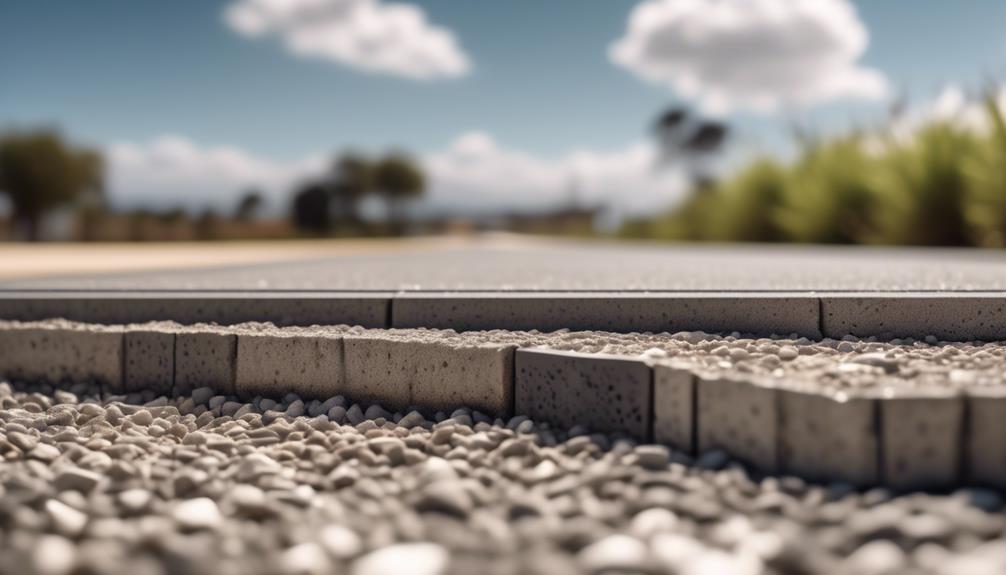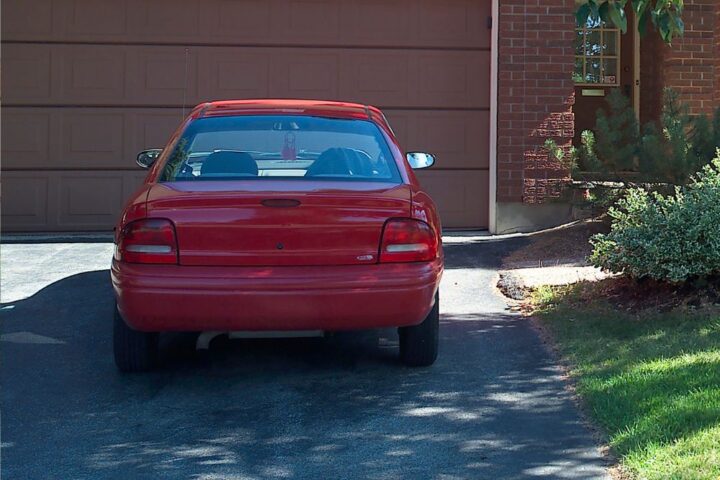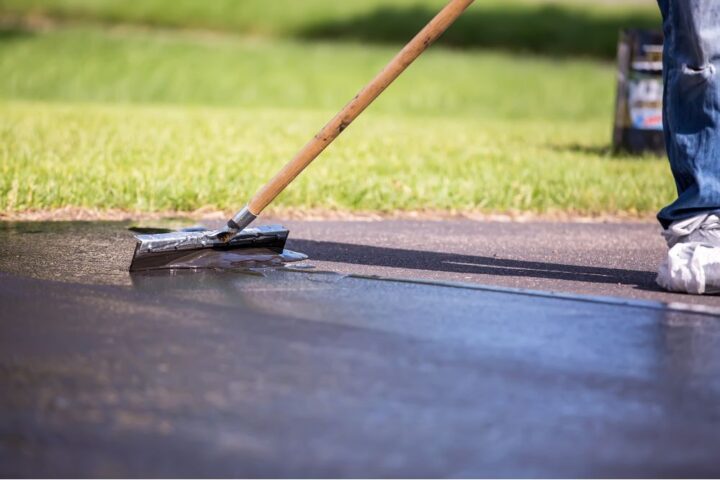When it comes to constructing a concrete driveway, one crucial factor that cannot be overlooked is the thickness of the concrete slab. The suitable thickness for a concrete driveway varies depending on several factors, including the type of vehicles that will be using it.
But what is the recommended thickness that ensures durability and longevity? How does it comply with Australian standards?
In this discussion, we will explore the various considerations and requirements for concrete driveway thickness, providing you with the necessary information to make an informed decision for your project.
Understanding Concrete Slab Thickness For Driveways
Understanding the appropriate thickness of a concrete slab is crucial for ensuring its durability and longevity, especially when it comes to concrete driveways in Melbourne. According to Australian Standards, the minimum thickness for concrete slabs is around 10cm. This thickness is necessary to prevent cracking and breaking, which can occur due to sun exposure and heat expansion. Thinner slabs are more prone to these issues and can lead to costly repairs in the future.
To further enhance the resilience of concrete slabs, it is recommended to incorporate concrete expansion joints. These joints allow the concrete to expand and contract without causing damage to the slab. Along with proper joint placement, there are three key elements that contribute to the strength of a concrete slab: base preparation, mix design, and curing.
Base preparation involves ensuring a solid and stable foundation for the concrete slab. This can be achieved by compacting the soil and providing adequate drainage.
The mix design should consist of high-quality cement, aggregates, and water, with the appropriate ratio to achieve the desired strength and durability.
Lastly, proper curing techniques such as keeping the slab moist and protected from extreme temperatures are essential for optimal slab performance.
Process Of Casting Concrete Slabs
The process of casting concrete slabs involves several key points.
One of these points is understanding the thickness requirements for the slab, which can vary depending on the specific application and load requirements.
Factors such as the type of traffic, climate conditions, and soil conditions can also affect the required thickness of the concrete slab.
Thickness Requirements
What is the recommended thickness for casting concrete slabs for driveways in Australia?
- The thickness of a concrete driveway varies depending on the type of vehicles that will be using it.
- For driveways that are expected to be used by vehicles weighing between 3t and 10t, a minimum thickness of 150mm is required.
- The Brisbane City Council mandates a minimum thickness of 125mm for household driveways.
- It is important to ensure proper construction of the driveway to avoid crushed concrete and structural failure.
- Steel reinforcement or mesh does not increase the load capacity of the driveway, but it does help control cracks.
- The thickness of the concrete driveway should be determined based on the anticipated heavy loads and the prevailing weather conditions in the area.
Factors Affecting Thickness
Factors influencing the required thickness of concrete slabs for driveways in Australia encompass various aspects of load-bearing capacity, climate conditions, reinforcement, sub-base preparation, and the intended purpose of the structure.
Load capacity is a critical factor, as driveways experience regular vehicular traffic and must be able to withstand the weight of vehicles without cracking or sinking.
Climate conditions, such as freeze-thaw cycles, can cause concrete to expand and contract, leading to cracking if the slab is not thick enough.
Reinforcement, such as mesh or rebar, can provide added strength and support to the concrete slab, reducing the required thickness.
Proper sub-base preparation is important to ensure a stable foundation for the concrete slab.
The intended purpose of the driveway, whether it’s for residential, commercial, or industrial use, will also impact the necessary thickness to accommodate the expected level of traffic and load.
Building inspections may be required to ensure compliance with the appropriate thickness standards for driveways.
Types Of Concrete Slabs And Their Thicknesses
Various types of concrete slabs are used in construction, each requiring specific thicknesses to ensure structural integrity and durability. When it comes to driveways in Australia, it is essential to choose the right type of concrete slab and determine the appropriate thickness to withstand the heavy loads and harsh weather conditions.
Here are two common types of concrete slabs used for driveways, along with their recommended thicknesses:
Plain Concrete Slab:
- Thickness: For a standard driveway, a plain concrete slab with a thickness of 100mm to 125mm is commonly used. However, if the driveway will be subjected to heavy traffic or large vehicles, it is recommended to increase the thickness to 150mm to 175mm for added strength.
Reinforced Concrete Slab:
- Thickness: Reinforced concrete slabs are ideal for driveways that will experience heavy loads or frequent use. The recommended thickness for a reinforced concrete slab is generally 125mm to 150mm. This type of slab includes steel reinforcement to enhance its strength and prevent cracking under pressure.
Standard Concrete Slab Thickness In Australia
To understand the standard concrete slab thickness in Australia, it is important to consider the minimum thickness requirements and the factors that can affect the thickness of the slab.
These factors include the type of slab, the presence of drop panels, and the weight of vehicles that will be using the driveway.
Minimum Thickness Requirements
The minimum thickness requirements for standard concrete slab thickness in Australia are determined based on the type of slab and its intended use. Here are the minimum thickness requirements for different types of slabs:
- For one-way concrete slabs, the standard thickness is 130mm for middle strips and 140mm for column strips.
- Two-way slabs on beams should have a minimum thickness of 125mm for slabs without drop panels and 100mm for slabs with drop panels.
- Flat plates have a standard thickness of 191mm.
- Grid or waffle slabs can have a thickness ranging from 75mm to 130mm.
When it comes to building a concrete driveway, the Brisbane City Council mandates a minimum thickness of 125mm. This ensures that the slab is strong enough to support heavy vehicles and withstand the demands of daily use.
Following these minimum thickness requirements is essential for constructing a durable and reliable concrete driveway.
Factors Affecting Thickness
Factors that influence the required thickness for a concrete driveway slab in Australia are determined by vehicle weight, traffic frequency, and compliance with local regulations.
The thickness of a concrete driveway slab is crucial in determining its ability to withstand wear and tear caused by vehicles. Heavy vehicles, such as trucks and SUVs, exert more pressure on the concrete surface, requiring a thicker slab to ensure durability.
On the other hand, driveways that will only be used by vehicles with less weight, such as sedans or motorcycles, may require a thinner slab.
Additionally, compliance with local regulations, such as those set by the Brisbane City Council, is essential in determining the minimum thickness requirements for the concrete driveway. Adhering to these factors will ensure a long-lasting and structurally sound driveway.
Minimum Concrete Slab Thickness You Can Use
With standards varying depending on the type of concrete slab, the minimum thickness for various designs in Australia can range from 75 mm to 191 mm. The thickness of a concrete slab is crucial for its structural integrity and durability. Here are the minimum concrete slab thicknesses for different designs:
- One-way concrete slabs: One-way slabs, which are commonly used in residential driveways, typically have a standard thickness of 130 mm for middle strips and 140 mm for column strips. These slabs provide adequate strength and crack control when properly reinforced with steel.
- Flat plates: For larger driveways or heavy-duty applications, flat plates are often used. These slabs have a standard thickness of 191 mm, providing optimal strength and load-bearing capacity.
- Two-way slabs on beams: Two-way slabs on beams, commonly used in commercial driveways, have a minimum thickness of 125 mm for slabs without drop panels and 100 mm for slabs with drop panels. These slabs should be reinforced with steel to ensure crack control and structural stability.
- Flat slabs: Flat slabs, which are often used in industrial driveways, have a minimum thickness of 125 mm for continuous interior panels without drops. Steel reinforcement is essential for crack control and to withstand heavy loads.
- Grid or waffle slabs: Grid or waffle slabs can have a thickness ranging from 75 mm to 130 mm. These slabs are lightweight and provide excellent crack control, making them suitable for residential driveways.
When designing a concrete driveway, it is important to consider the intended use, load requirements, and local building codes to determine the appropriate minimum concrete slab thickness. Proper steel reinforcement should be incorporated to enhance the strength and durability of the concrete slab.
Ideal Depth Of A Concrete Slab
For optimal durability and load-bearing capacity, the ideal depth of a concrete slab is determined by various factors. The thickness of a concrete driveway is expected to meet certain requirements in order to withstand the heavy loads and wear and tear it will experience over time. In Australia, the recommended minimum thickness for concrete slabs is around 10cm or 4 inches. However, for high-traffic areas such as driveways and garages, it is advisable to have thicker slabs to ensure their longevity and ability to handle the weight of vehicles.
The table below summarizes the ideal depth of a concrete slab based on the specific application:
| Application | Ideal Depth |
|---|---|
| Residential driveway | 10-15cm (4-6 inches) |
| Commercial driveway | 15-20cm (6-8 inches) |
| Garage | 15-20cm (6-8 inches) |
| Heavy-duty driveway | 20-25cm (8-10 inches) |
| Industrial facility | 25cm (10 inches) or more, as needed |
It is important to note that the thickness requirements for concrete slabs are essential to ensure proper load-bearing capacity. The use of steel reinforcement or mesh does not affect the required thickness or increase the load capacity of the slab. By following these guidelines, homeowners and builders can ensure that their concrete driveways in Australia are built to withstand the expected loads and provide long-lasting performance.
Call A Building Inspector To Check Your Slab
To ensure the structural integrity and safety of your slab, it is recommended to engage a professional building inspector for a thorough examination. Calling a building inspector can provide you with valuable insights into the condition of your slab and help you avoid potential financial burdens and safety hazards in the future.
Here are a few reasons why you should consider calling a building inspector to check your slab:
- Identify hidden defects: A building inspector has the expertise to identify any hidden defects or issues that may not be apparent to the untrained eye. They can uncover problems such as poor construction, inadequate reinforcement, or improper curing that may compromise the strength and durability of your slab.
- Ensure compliance with building standards: Building and pest inspections conducted by a qualified professional can help ensure that your slab meets the necessary building codes and regulations. This is especially important if you are planning to sell your property or obtain a building permit in the future.
Frequently Asked Questions
What Is the Australian Standard for Concrete Driveways?
Australian driveway regulations specify that the thickness of concrete driveways should meet certain standards. Factors affecting driveway thickness include expected vehicle weight and usage. Thicker concrete provides better durability and resistance to wear and tear.
What Is the Australian Standard for Concrete?
Australian concrete standards provide guidelines for driveway construction, including recommendations for concrete thickness. These standards ensure that driveways meet the required strength requirements, ensuring longevity and preventing structural failure.
Should I Use 100mm or 125mm Concrete Driveway?
When deciding between a 100mm or 125mm concrete driveway in Australia, it is important to consider the cost difference, durability comparison, maintenance requirements, and climate considerations. These factors will help determine the appropriate thickness for your specific needs.
Is 5cm of Concrete Enough for a Driveway?
The recommended concrete thickness for driveways depends on various factors such as expected vehicle weight and usage. While 5cm of concrete may be sufficient for light use, it may not provide adequate strength and durability for heavy traffic.
Conclusion
In conclusion, the recommended thickness for concrete driveways in Australia varies depending on the type of vehicles that will be using it.
For household driveways, the minimum thickness required is 125mm.
Driveways expected to be used by vehicles between 3t and 10t require a minimum thickness of 150mm.
Adhering to these thickness requirements is crucial to ensure the durability and longevity of the driveway, as well as to comply with Australian standards.




